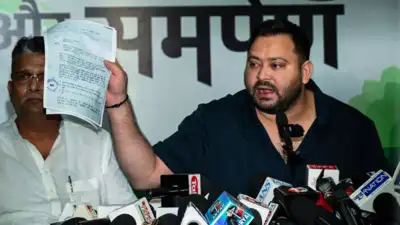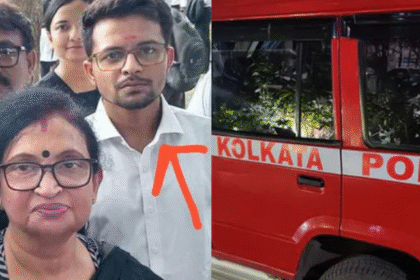The Twin Voter ID Controversy—Political Fallout and Democratic Implications
Democratic Integrity Under the Spotlight
In early August 2025, media in India focused sharply on Tejashwi Yadav—a key leader of the Rashtriya Janata Dal (RJD)—and a contentious twin voter ID issue that has sparked a fierce response from the Election Commission (EC). The EC’s issuance of an official notice demanding the return of one of two EPIC (Elector Photo Identity Card) cards has raised serious questions about electoral compliance, personal accountability, and the robustness of India’s democratic safeguards. This saga touches upon broader themes of trust in electoral administration and the intersection of law, politics, and public image.
Tejashwi Yadav—Political Context and Identity Controversy
Tejashwi Yadav, son of Lalu Prasad Yadav and a prominent leader in Bihar politics, is known for his electoral base and articulate public persona. In recent days, local media flagged something unusual: two active voter ID cards registered in his name. According to standard protocol, a citizen is permitted only one EPIC card. The discovery prompted immediate legal and procedural scrutiny. Election officials confirmed this may breach electoral norms and have serious implications under Section 31 of the Representation of the People Act, 1950.
The Election Commission Responds—Notice Served and EPIC Demanded
The EC acted swiftly. An official notice officially communicated to Tejashwi directed him to surrender one of the cards within a stipulated timeframe. According to election procedures, failure to do so can result in sanction—possibly including deregistration of electoral identity, disqualification, or legal proceedings. By intervening early, the EC reaffirmed its intent to maintain procedural fairness and electoral transparency, signaling that even senior political figures are not immune to statutory requirements.
Public and Media Reaction—Narratives in Play
While some sections of the media portrayed the episode as a bureaucratic error or formality, others interpreted it as a symbolic reckoning for political accountability. Editorials argued that such incidents potentially undermine public faith in election systems. Social media buzzed with hashtags relating to fairness and transparency. Supporters of RJD widely contended the issue would be resolved amicably, emphasizing intent rather than irregularity; critics, however, warned it could be symptomatic of deeper governance laxities.
Legal Landscape—What the Law Says About Dual EPIC Ownership
The Representation of the People Act stipulates that holding multiple EPIC cards is a violation, with possible penalties including the removal of improperly registered cards and electoral debarment. Since EPIC serves as the foundational document for democratic participation, any irregularity can result in procedural complications or allegations of vote manipulation. Authorities also review records of issuance, voter lists, and connected documentation to ascertain whether the duplicate was due to inadvertence or improper intent.
Political Ramifications—Image, Trust, and Electoral Credibility
For an opposition leader already under scrutiny, the incident carries reputational risks. Public trust hinges on perceived ethical conduct—especially in electoral stewardship. If unresolved, this controversy could be leveraged by rival parties to question the RJD’s commitment to democratic norms. Conversely, a transparent resolution—such as voluntary surrender of the extra EPIC—could reinforce political integrity and calm the situation. The incident thus becomes a test of crisis management, media strategy, and electoral morale.
Institutional Resilience—EC’s Role in Upholding Standards
The Electoral Commission’s decision to act promptly underscores its growing resolve to enforce compliance across the political spectrum. In recent years, the EC has taken firm steps—from delisting candidates over dual citizenship to disqualifying elected officials for false affidavits. Here too, the notice to Tejashwi reflects a broader institutional effort to deter misuse of electoral privileges and ensure the integrity of voter rolls.
A Microcosm of Democratic Accountability
This controversy, while centered on two voter ID cards, opens up critical questions about electoral fairness, political accountability, and institutional vigilance. The EC’s intervention reinforces the fine line between administrative oversight and democratic erosion. For the millions of Indian voters, the episode serves as a reminder that the democratic process thrives when rules are enforced impartially—even when it involves heavyweight political leaders.
The discovery of Tejashwi Yadav’s alleged possession of two active Voter ID cards not only sparked political attention but also spotlighted the underlying architecture of India’s voter registration system. How does such duplication happen? Are these isolated lapses or symptoms of deeper systemic vulnerabilities? Part 2 of our report investigates the procedural framework behind the issuance of EPICs, the checkpoints in place to avoid redundancy, and how lapses—whether unintentional or deliberate—might occur even today.
Understanding the EPIC System — Backbone of Electoral Identity
The Elector Photo Identity Card (EPIC), introduced in 1993, was designed to eliminate impersonation and streamline the electoral process in India. It has since become one of the most important forms of personal identification. Each card is supposed to be unique, linked to a voter’s constituency, demographic details, and—now increasingly—a digital footprint like Aadhaar. Yet, with over 95 crore registered voters, the system is massive, fragmented, and occasionally fallible.
Issuance Process — Where the System Can Break Down
The process to obtain an EPIC involves submitting Form 6 under the Representation of the People Act. This includes self-declared details: name, date of birth, address, and proof of identity. Ideally, this data is cross-verified by Booth Level Officers (BLOs) and Election Registration Officers (EROs). But several cracks remain:
- Manual Data Entry Errors: Minor spelling variations can create duplicate records that escape automated detection.
- Migration or Relocation: When individuals move between constituencies and apply afresh without proper deletion of their previous entry.
- Poor Coordination Between States: Electoral rolls are often maintained in silos by State Election Commissions, lacking central synchronization.
Case Studies of Duplication — Tejashwi Isn’t Alone
This isn’t the first such incident. Over the years, multiple political figures, bureaucrats, and common citizens have faced notices for dual EPICs. In several cases, these were honest mistakes—often due to shifts in residence or clerical oversights. However, others revealed deliberate attempts to register in multiple constituencies for tactical voting advantages. In this context, the EC’s strict scrutiny of Tejashwi’s case fits a broader, ongoing enforcement drive.
Role of Aadhaar and Tech Integration — The Promise and Pitfalls
In recent years, the Election Commission initiated the EPIC-Aadhaar linkage under the Electoral Reforms Bill to curb such duplication. While this integration offers a more robust verification layer, privacy advocates and opposition parties have resisted linking Aadhaar with voting credentials, citing concerns over surveillance and voter disenfranchisement. This resistance has delayed full implementation.
Moreover, Aadhaar mismatches and errors in name spellings have sometimes created new problems—leading to valid voter names being excluded during updates or deletions.
Institutional Responsibility — EC’s Measures for Preventing Redundancy
To address duplication, the EC has introduced:
- ERONet (Electors Verification Program): A centralized digital network to detect overlapping entries.
- De-duplication Software: AI-driven algorithms to flag similar demographic entries.
- Regular Purging Drives: The EC periodically cleanses electoral rolls, especially before general and state elections.
Still, implementation gaps exist. In states with low digital literacy or limited internet infrastructure, legacy data often remains unchecked, creating loopholes that allow duplicate voter IDs to exist for years.
Tejashwi’s Case in Context — Administrative Oversight or Political Leverage?
In Yadav’s case, it remains unclear whether the duplication was an honest error due to constituency changes over time or something more deliberate. RJD leaders argue that he has long been registered in multiple regions due to his political engagements and shifting addresses. However, opposition parties are framing this as a breach of trust and legal obligation.
If the issuance of two cards was facilitated without systemic checks, it raises serious concerns about the Election Commission’s ability to vet even high-profile individuals, let alone the general public.
The Need for Electoral Modernization and Political Prudence
Tejashwi Yadav’s voter ID controversy is emblematic of a broader issue—India’s democratic machinery still grapples with technological lag and bureaucratic inertia. The solution lies not just in punishing high-profile violations but in ensuring that the system itself becomes foolproof, interoperable, and digitally auditable.
As this saga continues to unfold, the real question remains: how many more such duplicates exist, and what institutional courage is needed to clean the system at scale?
As the Election Commission’s notice to Tejashwi Yadav over alleged twin voter ID entries sparks public and media scrutiny, the question now is whether this will remain a procedural hiccup or evolve into a political flashpoint. In Part 3, we delve into the political ramifications—how this issue may affect the RJD’s image, Tejashwi’s own leadership narrative, and the broader electoral dynamics of Bihar as the state approaches the 2025 assembly polls.
Tejashwi Yadav — The Face of RJD’s Next Generation
As the younger son of Lalu Prasad Yadav, Tejashwi has positioned himself not merely as a political heir but as a modern administrator. He served as Bihar’s Deputy CM and has been vocal about bringing development politics to the forefront. However, with allegations like this twin EPIC issue, opponents are now questioning whether he is just another product of the old political order—one that bends rules and institutions for convenience.
For Tejashwi, whose appeal has grown among youth and first-time voters, the perception of honesty and clean governance is crucial. Any hint of impropriety—no matter how administrative in nature—can dent his reformist image.
RJD’s Response — A Defensive Posture or Political Counterattack?
RJD leaders have dismissed the controversy as a “technical anomaly,” stating that the Election Commission’s database may contain outdated records from when Tejashwi changed residences or filed nominations from multiple constituencies. However, the party has also hinted that the timing of the notice—coming ahead of the state elections—suggests a politically motivated move.
This dual-track approach—deflecting blame while alleging conspiracy—has been part of RJD’s strategy in the past, especially when dealing with legal or procedural challenges. Yet, public sentiment in Bihar has evolved, and transparency is becoming more than a political buzzword.
The BJP and NDA’s Counter-Play — A Chance to Undermine RJD?
For the BJP-led NDA alliance, this controversy is a golden opportunity to corner Tejashwi and his party. Their narrative now emphasizes how RJD, despite its claims of transformation, continues to operate with old-world political tactics. The BJP’s campaign machinery has already started invoking themes of electoral fraud and the need for “clean politics.”
Leaders from the NDA camp argue that if a former Deputy CM could hold two voter IDs, it raises concerns about potential misuse of electoral rolls across the state. These arguments are not just about legal compliance—they’re strategic blows aimed at weakening Tejashwi’s growing popularity among Bihar’s urban and semi-urban electorate.
Media, Public Perception & Digital Echo Chambers
Media coverage, especially on digital platforms, has amplified this controversy. Social media discourse, often polarized, has seen hashtags like #DualVoterID, #TejashwiExposed, and #RJDTruth trend across regional Twitter and Facebook groups.
However, the impact on public perception is layered. While urban and educated voters may see this as a red flag about electoral malpractice, rural and core RJD constituencies may interpret this as yet another example of state institutions targeting their leaders unfairly. In Bihar, perception often cuts along class and caste lines, and the response to such controversies is rarely uniform.
Electoral Law and Possible Disqualification Risks
Under Section 17 of the Representation of the People Act, 1950, an individual cannot be enrolled in more than one constituency. If proven, this violation can attract penal provisions under Section 31, which includes imprisonment up to one year, or a fine, or both. However, the disqualification process is not automatic. It requires formal proceedings, sufficient evidence, and a legal ruling.
Legal experts believe that unless malintent is proven—i.e., Tejashwi intentionally sought electoral advantage from dual IDs—disqualification is unlikely. Nonetheless, the optics of facing such allegations can be politically damaging even if legally exonerated.
The 2025 Bihar Assembly Elections — What’s at Stake?
Bihar’s upcoming elections are already shaping up to be a high-stakes battle between generational change and legacy politics. Tejashwi’s RJD is expected to be the fulcrum of the INDIA bloc in the state, while the BJP-led NDA aims to capitalize on the narrative of governance, central support, and Hindutva consolidation.
In such a context, the voter ID controversy becomes more than just a personal or party issue—it becomes a campaign symbol. The RJD may pitch it as proof of harassment by central agencies. The NDA, in contrast, will likely use it to argue that the INDIA bloc cannot be trusted with democratic institutions.
A Battle of Narratives, Not Just Legalities
Ultimately, whether Tejashwi Yadav is legally culpable will depend on how the Election Commission proceeds and what investigations reveal. But in politics, especially in a state as symbolically significant as Bihar, perception is reality.
If RJD manages to frame the issue as victimization, it may rally its base even further. But if the BJP and allies can convince swing voters that Tejashwi represents electoral malpractice and inherited privilege, the damage may be lasting.
In the run-up to 2025, the dual voter ID issue is not just about documents—it’s about narrative ownership in an increasingly competitive political arena.
The Timeline — How It All Began
The issue was first brought to the EC’s attention through a formal complaint submitted by political opponents, alleging that Tejashwi Yadav was listed in two separate electoral rolls — one in Patna and another in Delhi. While dual listings may arise from a change of residence or clerical errors, such cases require rectification and are scrutinized especially stringently when involving public figures.
On July 30, 2025, the EC issued a notice to Tejashwi, seeking an explanation within a seven-day period. He was asked to confirm:
- Whether he was aware of both entries
- Why both entries were not flagged or corrected earlier
- Which of the two should be considered his valid voter ID
The deadline for his response: August 6, 2025.
Applicable Legal Provisions — More Than Just a Notice
The EC’s notice draws on two core statutes:
- Section 17 of the Representation of the People Act, 1950: Prohibits a person from being registered in more than one constituency.
- Section 31 of the Representation of the People Act, 1950: Prescribes punishment for false declaration in connection with voter registration — imprisonment up to 1 year, a fine, or both.
However, intent plays a crucial role in the EC’s decision. Was this an honest oversight? A systemic error? Or was there intent to misuse the electoral system? This is what investigators will now attempt to establish.
The Response Mechanism — What Tejashwi Can Do
Tejashwi Yadav’s legal team is expected to reply with one or more of the following:
- Voluntary cancellation of one EPIC number, likely the one outside Bihar.
- A clarification letter explaining the circumstances — possibly citing a change in official residence or filing of nominations from more than one constituency.
- An offer to cooperate fully with any further inquiry, thus portraying transparency and mitigating reputational damage.
Experts say that voluntarily surrendering one of the voter IDs and explaining the sequence of events without delay could protect Tejashwi from harsher proceedings and shift the narrative away from wrongdoing.
Institutional Process — What Happens After the Response
Once Tejashwi responds, the EC has three primary options:
- Close the case with a warning or advisory, especially if it appears to be a clerical or administrative lapse without malicious intent.
- Refer the matter for further investigation, possibly involving state electoral officers from both Bihar and Delhi to determine how and when the dual entry occurred.
- Initiate prosecution under Section 31 if there’s sufficient evidence of false declaration or wilful nondisclosure.
In politically sensitive cases, the EC typically moves cautiously, balancing legal rigor with the need to avoid appearing partisan. Hence, the next 2–4 weeks will be critical.
Can This Lead to Disqualification? The Legal Threshold
While Section 8 of the Representation of the People Act, 1951 outlines grounds for disqualification following conviction, simply holding dual voter IDs is not an automatic disqualifier. Disqualification would require:
- A criminal conviction (under Section 31 or relevant IPC sections),
- Sentencing to imprisonment of two years or more.
In Tejashwi’s case, unless the EC escalates this into a formal FIR and a conviction is secured by a competent court before the elections, disqualification is unlikely—though the political costs could still be steep.
Precedents — What History Tells Us
This isn’t the first time a public figure has faced such issues. In 2019, a senior Congress leader was found to have dual entries in electoral rolls in Mumbai and Nagpur. After inquiry, the leader voluntarily surrendered one registration and the EC did not pursue prosecution.
However, Tejashwi’s high-profile status as a national opposition leader and a key figure in the INDIA bloc means this case will be scrutinized far more closely—by media, public, and political opponents alike.
Public Communication — RJD’s Media Strategy
RJD’s media cell is working overtime to manage optics. Several spokespersons have hit primetime news panels, calling this a “non-issue being made into a controversy.” The party may soon release a detailed statement backed by legal documents, residence proofs, and electoral roll correction applications to neutralize any remaining doubt.
Tejashwi’s team is also considering an official press briefing or video message—something visually direct and emotionally resonant that can control the narrative and appeal to public sympathy.
Legal Tightrope with Political Implications
The procedural wheels have started turning, but the outcome will not be determined solely by legalese. This is as much a question of narrative control and institutional confidence as it is about EPIC numbers and election forms.
If Tejashwi’s team responds with promptness and clarity, and the EC takes a reasoned view of the matter, this could fade away quietly. But if missteps occur or evidence surfaces that suggests intent to mislead, the path forward could get politically hazardous.
One thing is clear: how the EC handles this issue will set a precedent for similar controversies in the future, especially with the rising digitization of electoral records and greater public scrutiny of politicians’ credentials.
Also Read : Western Support for Palestine Grows as UK, France and Canada Back Two-State Solution








